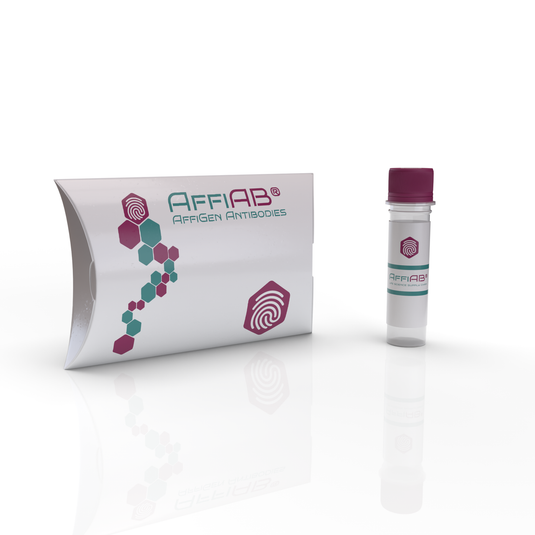AffiAB® Goat anti-CDH11 Polyclonal IgG Antibody
This goat anti-CDH11 polyclonal IgG antibody is expertly crafted to produce high affinity binding and sensitivity. The antibody is tested for specificity and reactivity against the expressed antigen, resulting in high accuracy and reliability.
Host: Goat
Species: Human
Description: Goat anti-CDH11 polyclonal IgG antibody is an antibody that specifically targets CDH11, also known as cadherin-11. CDH11 is a type II classical cadherin that plays a role in cell adhesion and migration during development, tissue remodeling, and cancer metastasis. The antibody is produced in goats and is purified from goat serum using various chromatography techniques. It can be used in various research applications such as Western blot, immunoprecipitation, immunofluorescence, and flow cytometry to detect and study the function of CDH11 in different tissues and diseases.
Gene Identifier/Accession Number: N/A
Form: N/A
Concentration: 4 mg/mL
Type: Primary
Clonality: Polyclonal
Isotype: IgG
Conjugation: Unconjugated
Application: Western Blot
Storage: For continuous use, store at 2-8 °C for one-two days. For extended storage, store in -20 °C freezer. Working dilution samples should be discarded if not used within 12 hours.
Special instructions: The antibody solution should be gently mixed before use.
Goat anti-CDH11 Polyclonal IgG Antibody
The study of cell adhesion molecules is fundamental in understanding various biological processes, including tissue development, immune responses, and the progression of diseases like cancer. Among these molecules, Cadherin-11 (CDH11), a type II classical cadherin, plays a crucial role. The Goat Anti-CDH11 Polyclonal IgG Antibody has emerged as an essential tool in the study of CDH11, offering insights into its function and implications in various biological contexts. This article provides an overview of this antibody, highlighting its production, characteristics, and applications in scientific research.
Background: Understanding CDH11
CDH11, predominantly expressed in osteoblasts and certain mesenchymal cells, is involved in cell-cell adhesion and signaling. It plays a significant role in the development of the bone and other tissues. Aberrant expression of CDH11 has been implicated in various pathological conditions, including fibrosis, rheumatoid arthritis, and particularly in cancer metastasis, making it a protein of considerable interest in medical research.
Production of Goat Anti-CDH11 Polyclonal IgG Antibody
To create the Goat Anti-CDH11 Polyclonal IgG Antibody, goats are immunized with a CDH11 antigen. This process elicits an immune response, leading to the production of antibodies that recognize specific epitopes on the CDH11 protein. These antibodies are subsequently purified from the goat serum, ensuring specificity and a high degree of affinity for CDH11.
Characteristics of the Antibody
Specificity:
The antibody is highly specific to CDH11, which is crucial for accurate detection in various experimental settings.
Affinity:
High binding affinity to CDH11 ensures effective detection.
Versatility:
Suitable for multiple applications, including Western blotting, immunohistochemistry, and flow cytometry.
Applications in Research
Cancer Research:
The antibody is used to study CDH11's role in cancer, particularly in understanding how its expression influences tumor progression and metastasis.
Developmental Biology:
It aids in investigating the role of CDH11 in bone development and the formation of other tissues.
Pathology Studies:
Research into diseases like osteoarthritis and fibrosis utilizes this antibody to explore the involvement of CDH11 in disease mechanisms.
Cell Adhesion and Signaling Studies:
The antibody facilitates the study of cell-cell adhesion processes and related intracellular signaling pathways.
Quality Control and Storage
The Goat Anti-CDH11 Polyclonal IgG Antibody undergoes stringent quality control to ensure high purity, specificity, and activity. It is typically stored in a buffered solution at -20°C, preserving its stability and reactivity for long-term use.
Safety and Handling
As with any biological reagent, handling the antibody requires adherence to safety guidelines. Appropriate laboratory practices, including the use of personal protective equipment, should be followed to ensure safe handling.
Conclusion
The Goat anti-CDH11 Polyclonal IgG Antibody is a vital research tool in understanding the complex roles of CDH11 in normal physiology and various diseases. Its ability to specifically target CDH11 aids in the detailed study of cell adhesion, signaling pathways, tissue development, and the progression of pathological conditions like cancer. The versatility and specificity of this antibody make it an invaluable asset in the fields of cancer research, developmental biology, and pathology.

